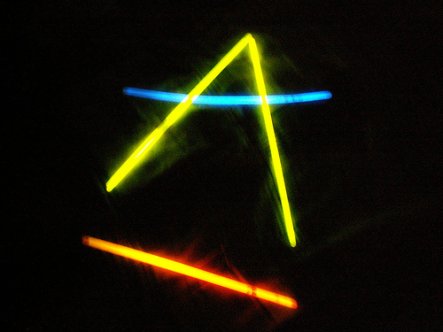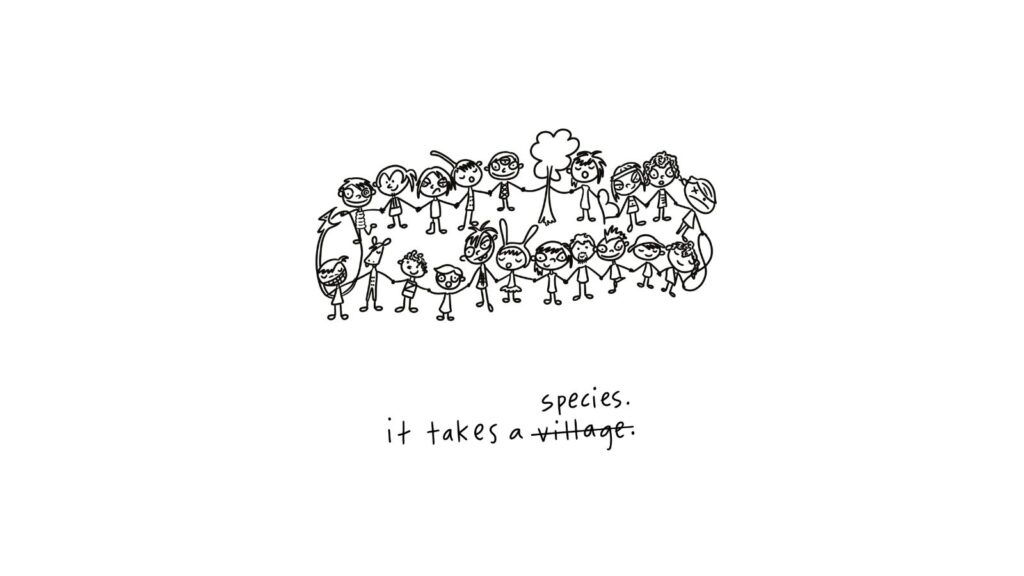About five years ago, I stopped hanging out and doing work in the anarchist community because it wasn't meeting my needs. The community wasn't doing the kind of work I'm most interested in, it was completely white-centric, and it tended to silence me when I got the most passionate. In short, the anarchist community in the city I was living in failed me.
But I never stopped considering myself an anarchist.
During my hardcore anarchist years, the same tiresome things kept happening. I'd attend meetings or events and realize folks were glaring at my child. There was often a palpable feeling in the air "Who is this breeder? Doesn't she know her kid isn't welcome?" This always made me feel like saying, "Listen, you stinky motherfucker, your impressively righteous punk patches and by-the-book taste in music notwithstanding, you don't get to decide whose party this is, and just because you're uncomfortable with your own parents and class privilege doesn't mean all parents, or all kids suck. It might mean that you suck, though. Now go throw a rock at a window and call it revolution." But I never did, probably because I didn't feel like inviting the backlash such a comment would bring.
As time went on and I became more vocal in the community, even more tiresome things kept happening: people continued to insinuate that my mama comrades and I were expecting a handout when we suggested they offer free childcare at events, somehow white men always dominated the discussion and organizing efforts and succeeded in drowning out the voices of those they did not agree with, and in one surreal instance, I was publicly compared to Andrea Dworkin, of all people, for standing up in defense of a fellow woman organizer. Too often I felt misunderstood and marginalized. All the evidence started to add up that, as much as I loved my community, it was not the right spot for me to do my work.
Realizing that I was perpetually on the verge of a giant rant, I decided that if my anarchist community refused to grow up, it didn't mean that I had to do the same. So I dropped out, and started many humbling years as a just-scraping-by community organizer, trying to create human-scale neighborhood solutions aimed at solving some of the problems in places I lived.
But I never stopped considering myself an anarchist, even though that affiliation would make as much sense to many of my current friends and neighbors as "card-carrying Martian."
In fact, I am a die-hard anarchist. (This, even, from a person who refuses even to describe herself as "feminist" because she has too many disagreements with what most people consider feminism.) The one label, other than mother, that I use with comfort is "anarchist." I fucking love the ideology of anarchism. Even if I find it hard to connect with the theory of crusty old Russians — possibly more relevant to male industrial revolution-era workers than to poor mothers of the 21st century — I will always be passionately convinced that each person deserves access to all the necessary tools to make her life what she wants it to be; that we don't have to go knocking on some rich, educated person's door, or tug on our congressman's coat to ask politely for some solutions; that everyone on earth deserves justice, and to experience the richness of human life, now, not later; and that people should be held accountable for the messes we've created. That is my anarchism.
I just didn't want to spend my life arguing with the people I thought should have my back.
Let me ask a question. What percentage of anarchist events, without being asked, provide childcare? Are there any anarchist communities in the US that provide elder care? There are uncountable ways we could address these simple issues, but for some reason we'd rather read about how they did things in 1930's Spain than develop a nuanced and sustainable plan for a truly new society in the shell of the old. Hey, I love reading about the Spanish Civil War, too, but something is off when we'd rather talk at each other about times long past until we're blue in the face because it is so much less risky to talk than to do the hard work of making things better.
Often, we ghettoize ourselves in our comfort zones, to a point that anyone who doesn't fit the anarchist "description" feels as out of place as a fat woman in a fashion magazine. Hell, at almost every anarchist meeting or event I went to with my kid, I was given the side eye. It gets old. One guy at the infoshop refused to pass off the keys to me because he didn't "trust" me. Well, I guess he was right, I didn't fit into his version of anarchism: a white boys club that holds endless geekout sessions about whether the police qualify as "workers." Count me and my kid out, thanks.
Often, our concept of what is revolutionary is not really a mature concept of true revolution. If you've ever thrown a rock through a window, you know what I'm talking about. It feels good, but ultimately, someone just comes and fixes that window. It would be nice to really dismantle something, or really create something lasting. We need comprehensive solutions-based thinking, because these are some big-ass problems we're dealing with, and when the going gets tough, daddy is not going to drive up in his SUV and solve them by throwing some money around. Neither is the government, which is being eaten alive by a corporate cancer and outsourcing more and more of its most basic functions, going to be able to deal with the reality of the situation in a few years. Will we be ready the day that no water comes out of the tap, that the light switch does not make the electricity come on? Katrina was just a dry run for some of the awfulness that could happen. And not enough people see it coming.
It's time to walk the walk, not just talk the talk.
Another question: how much does an white-centric infoshop in a poor neighborhood of color really accomplish? What is the average lifespan of an anarchist infoshop anyway? I apologize for my bluntness, but please, don't have the self-important illusion that you are really fomenting the revolution or helping anyone. Get your ass to community meetings, town hall meetings, listen, talk to people outside your comfort zone. Organize. Get yourself out of the anarchist ghetto.
Only the hard work of making things better will dismantle the current society by making it outdated and obsolete. Current "solutions" have already been obsolete for many of us: I haven't had health insurance for 13 years. My food stamps were canceled this month. Folks, we need whole systems thinking and entire structures of mutual aid that are accessible to people who may not have social networks or anarchist caché. Where is the anarchist federation of time banks that organize community health care? Where are our anarchist restaurants with free food for poor single parents, disabled veterans and the homeless, locatable to all in the yellow pages? When the landlord raises the rent again, where are our anarchist sanctuaries with safe, clean and cheap roomshares that are child-friendly?
We're not doing good enough. We are too complacent.
But I never stopped considering myself an anarchist (and I can't deny that I will always have a huge soft spot for even the most closed-minded black-flag scenesters who may not grow out of calling me a breeder). I believe, now more than ever, that anarchist principles are the answer. Every single anarchist needs to be a kick-ass community organizer — we need to spread decentralized solutions-based thinking before it's too late and fascist corporate capitalist "restructuring" solutions take over when disaster hits (like in New Orleans, where I hear all of the public schools have been privatized, housing projects shuttered, and neighborhoods left to rot). We need to proactively empower our communities and brace for the coming disasters. The tidal wave will come, and we can carry on with our infoshops and punk shows, which are really comfortable, after all, or we can create accessible solutions that provide resilience for our families and our communities.
We can grow up and do more of the work that makes things better: creating community-based health care, organizing child and elder care systems of mutual support, opening intergenerational democratic free schools, turning unused properties into peoples' art museums, implementing permaculture gardens and food forests, organizing free transportation, sustainable community housing, public safety programs, anarchist conflict resolution and mediation centers, and taking part in rituals that bind our community together. The possibilities are endless, and we've all imagined them.
Perhaps the best first step is to look for folks who have been doing this work in our communities for ages. Maybe that's the person standing next to you at the punk show. And maybe it's not.
Amy Hamilton is a mother, community organizer, writer, dancer, choreographer and anarchist. A founder of Mothers Alliance for Mutual Aid, she has also worked on various other projects focused on grassroots economics, youth empowerment, children's education, sustainability, and green jobs. She is the creator of the Pipsissewa Movement Project.
Image by *** Fanch The System !!! ***, courtesy of Creative Commons license.















